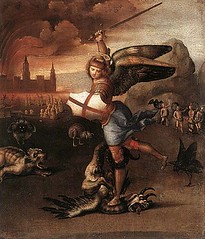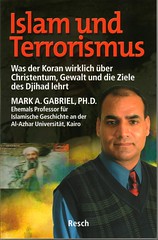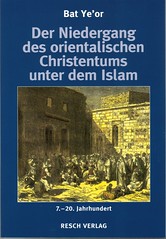 By Robert Royal - Special to the HERALD
By Robert Royal - Special to the HERALDFollowing is part of an ongoing series of articles appearing in the Herald based on Bob Royal's book Catholic Martyrs of the 20th Century.
Pakistan’s relatively small Christian community of 2 million, about 3 percent of the population (two-thirds of them Catholic), has been subjected to systematic repression and death. Pakistan became an independent nation in the 1940s when India, which had previously included the region now known as Pakistan, ended its long existence as a British colony under the leadership of Mohandas Gandhi.
Though created to secure religious security for its own population, the Pakistani government has not extended religious rights to non-Muslims. In fact, in 1986 Pakistan adopted a religious blasphemy law. Section 295.C of the new Penal Code declares: "Whoever by words, either spoken, or written, or by visual representation, or by any imputation, innuendo, or insinuation, directly, or indirectly, defiles the sacred name of the Holy prophet Muhammed (peace be upon him) shall be punished with death." Given the ease with which such a sweeping law can be abused, it made it all but inevitable that Christians will be condemned to death.
Trials, when they occur, are far from impartial or peaceful. In 1993, Salamat Masih, a 12-year-old, and two other Christians were accused of having written a blasphemous slogan on a village mosque, even though all three were only semi-literate and were unlikely to have been able to write anything at all. During the course of their trial, they were attacked by an armed band. Salamat and one of his co-defendants were wounded and Manzoor Masih was killed.
International pressure forced the Lahore High Court to overturn the conviction of the surviving youths. The judge who made the decision, Arif Iqbal Bhatti, was assassinated shortly after. The two young Christians went into exile, but Islamic Fundamentalists have offered a $30,000 bounty for their deaths.
This incident was only one of many in Pakistan. In February 1997, 30,000 Muslims in the Punjab province burned and looted 13 Catholic churches and a Salvation Army center. Christian schools, businesses, and homes were sacked. The village of Shantigar, with a mostly Catholic population of 15,000, was destroyed. Police were slow to respond to reports of such illegal attacks by one group of citizens on another. Several Catholics were killed in the mob violence and John Paul II took the unusual step of sending a personal protest to the government.
A public demonstration in the Pakistani capital, Islamabad, against the Shantigar violence only led to further arrests and beatings. Violent incidents occur almost daily. In May 1998, Ayub Masih was arrested merely for mentioning the controversial Islamic novelist Salman Rushdie — a charge he denied. But the blasphemy law makes it easy for anyone with a grudge against a Christian to bring unsubstantiated complaints that may lead to a mandatory death sentence.
Perhaps the most blatant instance of Christian martyrdom in Pakistan occurred in May of 1997. John Joseph, Bishop of Faisalabad and the first native Pakistani to run that diocese, died under suspicious circumstances in front of a court building. Pakistani officials claimed later that the bishop had committed suicide out of protest against anti-Catholic repression. Suicide by a courageous Catholic bishop, who had advocated non-violence, would, of course, have been an unorthodox way to protest.
The bishop had already distinguished himself for his public defense of those condemned under the blasphemy laws. For that work, he had received multiple death threats. A night watchman at the court reported to police that he had seen a car pull up to the gate and two men throw out a body. Though he called the police, they did not arrive for two hours. The bishop’s death evoked international outrage, but the Pakistani government has not carried out any credible investigation into the matter. At Bishop John Joseph’s funeral, Muslim mobs burned and looted Christian homes and the police fired on the 10,000 people gathered to mourn his passing.
The case of Pakistan is an important one because it reflects an emerging pattern in the Muslim world. Under the guise of religious law, Pakistan is making it all but impossible for Christians and other non-Muslims to find work. According to a Pakistani bishop, 90 percent of them are unemployed, and those who find jobs usually have to work at the mot menial tasks such as street cleaning. They are discriminated against when they look for housing.
The blasphemy law is merely the strongest weapon in the government’s battles against non-Muslims. This type of forced Islamization is by no means accepted by all scholars of the Koran in the Muslim world. But some Muslim countries, under Fundamentalist pressure, have even petitioned the United Nations to block the very use of terms such as "Islamization" to describe growing Fundamentalist campaigns of religious purity that involve persecution and death.
Saudi Arabia, the homeland of Islam, is even far more restrictive than Pakistan. Public Christianity is absolutely forbidden and, at least in theory, it is a punishable offense to say Christian prayers in your own home. When the Coalition Forces were stationed in Saudi Arabia during the 1991 Gulf War, for example, they were told they were not allowed to offer Christian prayers before battle. As elsewhere in the Islamic world, a Muslim who converts to Christianity is subject to the death penalty.
Saudi Arabia has a large contingent of guest workers, almost a quarter of the population, many of whom are Catholics from the Phillippines. Those caught trying to organize Christian services have been arrested and beaten; almost a thousand cases have been documented since 1990 alone. But penalties can be far worse: flogging, amputation, and beheading. Oswaldo Magdanal and Renato Poesdio, two Filipinos. were scheduled for beheading on Christmas day 1992 until an international protest led to their deportation. Just before Christmas day 1999, another Filipino was arrested for having an English-language Bible in a locked cabinet at his workplace.
Roughly equivalent abuses of rights occur throughout the Muslim Middle East in Kuwait, Qatar, Oman, and the United Arab Emirates. Even Turkey, the most secular and Westernized of the Islamic countries, still restricts open Christian practice and converts from Islam may face death there. Turkey and Iran have also been trying to extend their influence into the mostly Islamic Central Asian Republics that have become independent since the breakup of the Soviet Union.
It seems certain that the Islamic world will show widespread and continuing persecution and martyrdom of Christians for many years to come.
Source: Arlington Catholic Herald
Robert Royal, Ph.D. is president of the Faith & Reason Institute in Washington, D.C. Dr. Royal holds a B.A. and M.A. from Brown University and a Ph.D. in Comparative Literature from the Catholic University of America. He has taught at Brown University, Rhode Island College, and The Catholic University of America. He received fellowships to study in Italy from the Renaissance Society of American (1977) and as a Fulbright scholar (1978). From 1980 to 1982, he served as editor-in-chief of Prospect magazine in Princeton, New Jersey. He is a regular columnist for Crisis magazine and his articles have appeared in numerous scholarly journals and other publications, including First Things, Communio, the Wilson Quarterly, the Catholic Historical Review, the Washington Post, the Washington Times, National Review, The Wall Street Journal, and The American Spectator. His most recent book publication is The Catholic Martyrs of the Twentieth Century: A Comprehensive Global History (2000, Crossroad). He writes and lectures frequently on questions of ethics, culture, religion, and politics, and has appeared on various television and radio stations around the United States.




No comments:
Post a Comment